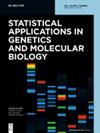Sample size calculation based on generalized linear models for differential expression analysis in RNA-seq data
IF 0.9
4区 数学
Q3 Mathematics
Statistical Applications in Genetics and Molecular Biology
Pub Date : 2016-12-01
DOI:10.1515/sagmb-2016-0008
引用次数: 7
Abstract
Abstract As RNA-seq rapidly develops and costs continually decrease, the quantity and frequency of samples being sequenced will grow exponentially. With proteomic investigations becoming more multivariate and quantitative, determining a study’s optimal sample size is now a vital step in experimental design. Current methods for calculating a study’s required sample size are mostly based on the hypothesis testing framework, which assumes each gene count can be modeled through Poisson or negative binomial distributions; however, these methods are limited when it comes to accommodating covariates. To address this limitation, we propose an estimating procedure based on the generalized linear model. This easy-to-use method constructs a representative exemplary dataset and estimates the conditional power, all without requiring complicated mathematical approximations or formulas. Even more attractive, the downstream analysis can be performed with current R/Bioconductor packages. To demonstrate the practicability and efficiency of this method, we apply it to three real-world studies, and introduce our on-line calculator developed to determine the optimal sample size for a RNA-seq study.基于广义线性模型的RNA-seq数据差分表达分析样本量计算
随着RNA-seq技术的快速发展和成本的不断降低,测序样品的数量和频率将呈指数级增长。随着蛋白质组学研究变得更加多元和定量,确定研究的最佳样本量现在是实验设计的重要一步。目前计算研究所需样本大小的方法主要基于假设检验框架,该框架假设每个基因计数可以通过泊松分布或负二项分布进行建模;然而,当涉及到容纳协变量时,这些方法是有限的。为了解决这一限制,我们提出了一种基于广义线性模型的估计方法。这种易于使用的方法构建了一个代表性的示例数据集并估计条件功率,所有这些都不需要复杂的数学近似或公式。更有吸引力的是,下游分析可以使用当前的R/Bioconductor封装进行。为了证明该方法的实用性和效率,我们将其应用于三个现实世界的研究,并介绍了我们开发的在线计算器,以确定RNA-seq研究的最佳样本量。
本文章由计算机程序翻译,如有差异,请以英文原文为准。
求助全文
约1分钟内获得全文
求助全文
来源期刊
CiteScore
1.20
自引率
11.10%
发文量
8
审稿时长
6-12 weeks
期刊介绍:
Statistical Applications in Genetics and Molecular Biology seeks to publish significant research on the application of statistical ideas to problems arising from computational biology. The focus of the papers should be on the relevant statistical issues but should contain a succinct description of the relevant biological problem being considered. The range of topics is wide and will include topics such as linkage mapping, association studies, gene finding and sequence alignment, protein structure prediction, design and analysis of microarray data, molecular evolution and phylogenetic trees, DNA topology, and data base search strategies. Both original research and review articles will be warmly received.

 求助内容:
求助内容: 应助结果提醒方式:
应助结果提醒方式:


